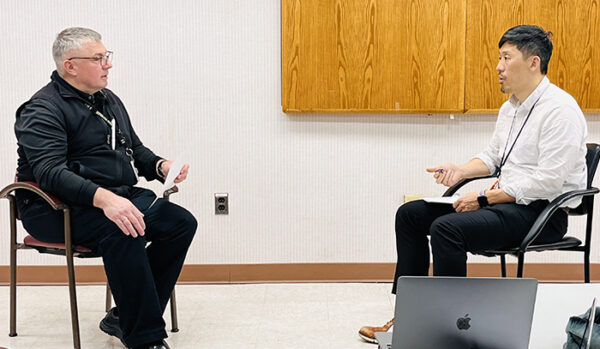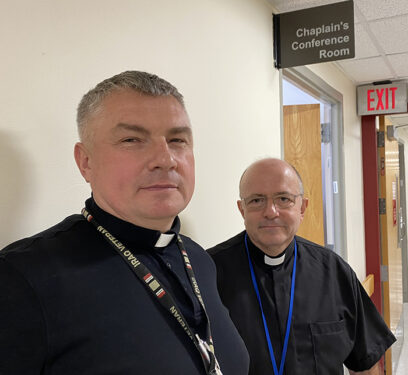
KIPS BAY — The distraught woman who served in the military pleaded with a chaplain from the U.S. Department of Veterans Affairs to explain where was God when she got raped.
“I haven’t had a good day in a long time,” she told the priest in a conversation recorded on video. “My kids (she has two) — I’m no good for them. My body has been violated. I should be able to protect myself. How can I protect my kids?
“And where was God? You’re a chaplain, right? Maybe you can tell me where he was.”
“I ask it all the time myself,” said the chaplain, a Catholic priest. “These are things we can talk about — how you view God.”
He asked, “What kind of support systems do you have?”
“Support systems?” she blurted. “What support systems? Nobody takes you seriously — I’m a woman. I can’t go on.”
The veteran described her “plan.”
“It’s red, white, and blue,” she said. “I have vodka, which is white, and there’s red pills and blue pills. Where else do I go? I’m done.”
This scene highlights a training video produced for chaplains at the VA New York Harbor Healthcare System in Manhattan.
VA officials value their patients’ privacy and do not refer journalists to them. Instead, they shared the training video, which is a dramatization.
But Father Ivan Tyhovych, a VA chaplain, assures that real versions of the conversation happen “all the time.” A former U.S. Army chaplain in Iraq, he now works full time for the VA.
“Many of them experienced traumatic situations,” Father Tyhovych said. “They carry that trauma into their personal lives. So we’re trying to bring them back to some kind of normalcy that they deserve, without shame, without guilt.”
Reducing self-harm among service members is a top priority of the VA, said Kate Mostkoff, a suicide prevention coordinator for the VA’s New York Harbor Health System.
The campus is in the Kips Bay neighborhood on Manhattan’s East Side, but it serves veterans from all over New York City.

Mostkoff explained how Congress in 2007 commissioned a blue-ribbon panel, which reported alarming increases in veteran suicide rates.
The War on Terror was underway. The nation’s all-volunteer military regularly sent personnel on multiple deployments to faraway combat zones in Afghanistan or Iraq.
A dozen years after the commission, a grim statistic emerged: on average each day, 20 veterans were taking their own lives.
The VA responded with more robust programs at all of its hospitals, including community outreach teams and a Veterans Crisis Line (dial 988, then press 1).
Perhaps that is why veteran suicide rates dipped in recent years across the U.S.
“That number, 20 per day (nationwide), was accurate five or six years ago,” Mostkoff said. “It’s less now. The last number I remember hearing was about 17 a day.”
Still, Mostkoff agreed with Father Andrew Sioleti, chief of New York Harbor Healthcare chaplains, that any number of veterans considering suicide deserve help.
Father Sioleti said that although the suicide number has gone down, VA officials won’t let up on adding more services. Soon they will embark on a new routine of identifying at-risk patients. The goal is to stay in contact with them and offer appropriate services, if needed.
The chaplains aren’t all Catholics. Others come from the Jewish, Muslim, and Protestant faiths.
Often, they work as somewhat “intake” specialists. Veterans who ask to see a chaplain are met with empathetic ears. During these visits, chaplains determine which VA services to suggest.
Veterans with no hope, such as the woman in the training video, are referred to Mostkoff’s team of suicide prevention clinicians. But their work does not end there. Chaplains are available to meet weekly.
Father Sioleti said they are uniquely skilled at dealing with veterans’ spiritual issues.
“Anybody who was in combat can tell you it’s a very painful experience,” Father Sioleti said.
“There are a lot of issues, and one of them is moral injury.
“They have done something, perhaps killed someone, which they were told was ‘the right thing’ by the military — the ‘just war’ theory.”
Still, Father Sioleti explained, many can’t shake the guilt, especially if they know the victims, such as innocent children, were collateral damage.
“They need therapy,” Father Sioleti said. “But we, the priests — talking to Catholics or non-Catholics — we journey with them too. We go deep and stay with them as they lament.”
Father Tyhovych said chaplains encountering distraught veterans ask early in the conversations if they have ideations of harming themselves. They also ask, “Do you have a plan?”
Father Tyhovych is also pastor of Holy Ghost Parish Ukrainian Catholic Church in Williamsburg.
The priest noted that some people in Iraq are just like people in Ukraine. Despite their grim circumstances, they manage to hope for better days.
Father Tyhovych said the traumatized U.S. veteran can also re-experience hope and joy with a chaplain’s help, which, ultimately, is help from God,
“We can provide that kind of support that they need,” he said. “I can tell them, ‘I was in combat too. I understand. I’m not here to judge. I’m not here to criticize.’
“I’m here to provide that kind of support that they need, where they can readjust themselves and experience that kind of joy and happiness that they deserve.
“I think that’s very important because life is a gift from God that we all need to enjoy — to be happy.”
